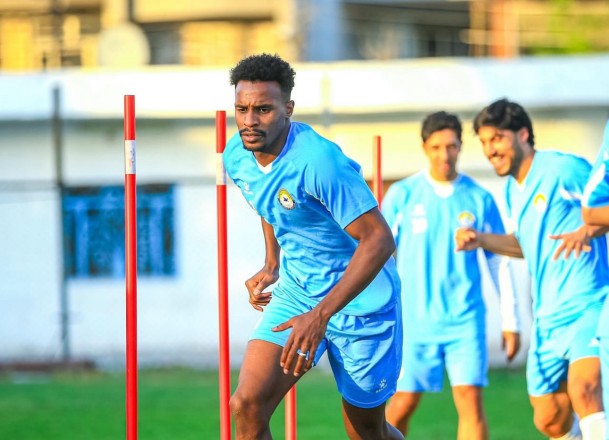
Iraqi League Opens Its Season After Historic Spending
Iraqi Premier League clubs recorded a record spending in their contracts with players, just before the start of the 2025-2026 season, which directly reflected on the market value of the tournament in its 52nd edition, which will see the participation of 20 clubs starting next Saturday.
Although Iraqi clubs have been allowed to contract with foreign professional players since the 2009-2010 season, the level of spending this season is unprecedented since the launch of the official first edition of the league in 1974-1975.
Al-Zawraa Club, the record holder for the number of titles (14 titles), entered the new season with a budget of $6.1 million, according to club president Haidar Shanshul. He explained that these funds allocated by the Ministry of Transport will be spent on professional player deals, salaries of local and international stars, as well as settling previous debts.
Shanshul confirmed that the selection of new players was based on the vision of coach Abdul Ghani Shahed, pointing out that fan revenues will also contribute to supporting the club's resources.
Among its most notable signings are: Jordanian Abdullah Naseeb, Nizar Al-Rashdan, Raziq Bani Hani, Cameroonian Clarence Biyang, Bahraini Mahdi Hamidan, and Nigerian Ibrahim Tomio.
As for Al-Shorta, the champion of the last two editions, they strengthened their squad with signings valued at approximately $4.5 million, according to reports. Board member Tahseen Al-Yasiri confirmed that the club's goal this season is twofold: to defend the title locally and to present an honorable participation in the AFC Champions League, after the team exited disappointed in its previous participation.
The team included prominent names such as: Moroccan Muhannad Al-Ashabi, Brazilian Moses Lucas, Senegalese Dominique Mendy, Cameroonian Lionel Atiba, while retaining the services of Syrian Mahmoud Mawas and Nigerian Abdul Majid Abu Bakr.
Large spending is no longer exclusive to capital clubs, as some provincial clubs have kept pace with the event, most notably Al-Karma, which allocated $4.5 million for contracts.
Club spokesman Ali Ismail stated that the management prioritized attracting stars capable of competing for the league title, adding: “After a successful first season, we proved that there are no limits to our ambitions, and the next phase requires big names.”
The club completed one of the most notable signings of the season by acquiring international scorer Ayman Hussein, alongside Brazilian Jefferson Bahia, Jordanians Muhammad Abu Hashish, Ibrahim Saada, and Ali Alwan, Nigerian Youssef Amro, Omani Jameel Al-Yahmadi, and Moroccan Ayoub Al-Moudan.
Among the notable signings as well is the acquisition of the seasoned Algerian international Sofiane Feghouli (35 years old) by Baghdad Municipality, coming from the Turkish league after long experiences in Europe, most notably with Valencia and West Ham. The deal was considered a qualitative addition, given the player's continental and international experience capable of making a difference.
With these massive investments, Iraqi league clubs are now facing a real test to deliver a level commensurate with the size of the spending. Competition has become more expansive, with provincial clubs strongly entering the line of significant signings, promising an exciting season where stars are distributed across multiple teams, not limited to the capital's giants.
Although Iraqi clubs have been allowed to contract with foreign professional players since the 2009-2010 season, the level of spending this season is unprecedented since the launch of the official first edition of the league in 1974-1975.
Al-Zawraa Club, the record holder for the number of titles (14 titles), entered the new season with a budget of $6.1 million, according to club president Haidar Shanshul. He explained that these funds allocated by the Ministry of Transport will be spent on professional player deals, salaries of local and international stars, as well as settling previous debts.
Shanshul confirmed that the selection of new players was based on the vision of coach Abdul Ghani Shahed, pointing out that fan revenues will also contribute to supporting the club's resources.
Among its most notable signings are: Jordanian Abdullah Naseeb, Nizar Al-Rashdan, Raziq Bani Hani, Cameroonian Clarence Biyang, Bahraini Mahdi Hamidan, and Nigerian Ibrahim Tomio.
As for Al-Shorta, the champion of the last two editions, they strengthened their squad with signings valued at approximately $4.5 million, according to reports. Board member Tahseen Al-Yasiri confirmed that the club's goal this season is twofold: to defend the title locally and to present an honorable participation in the AFC Champions League, after the team exited disappointed in its previous participation.
The team included prominent names such as: Moroccan Muhannad Al-Ashabi, Brazilian Moses Lucas, Senegalese Dominique Mendy, Cameroonian Lionel Atiba, while retaining the services of Syrian Mahmoud Mawas and Nigerian Abdul Majid Abu Bakr.
Large spending is no longer exclusive to capital clubs, as some provincial clubs have kept pace with the event, most notably Al-Karma, which allocated $4.5 million for contracts.
Club spokesman Ali Ismail stated that the management prioritized attracting stars capable of competing for the league title, adding: “After a successful first season, we proved that there are no limits to our ambitions, and the next phase requires big names.”
The club completed one of the most notable signings of the season by acquiring international scorer Ayman Hussein, alongside Brazilian Jefferson Bahia, Jordanians Muhammad Abu Hashish, Ibrahim Saada, and Ali Alwan, Nigerian Youssef Amro, Omani Jameel Al-Yahmadi, and Moroccan Ayoub Al-Moudan.
Among the notable signings as well is the acquisition of the seasoned Algerian international Sofiane Feghouli (35 years old) by Baghdad Municipality, coming from the Turkish league after long experiences in Europe, most notably with Valencia and West Ham. The deal was considered a qualitative addition, given the player's continental and international experience capable of making a difference.
With these massive investments, Iraqi league clubs are now facing a real test to deliver a level commensurate with the size of the spending. Competition has become more expansive, with provincial clubs strongly entering the line of significant signings, promising an exciting season where stars are distributed across multiple teams, not limited to the capital's giants.









